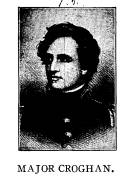Ohio History Journal
The Croghan Celebration. 73
three tremendous cheers. The day was a
glorious one for the
cause of freedom." This of course
foreshadows the civil war.
"Who used Old Betsy last?"
asks the Journal of January
23, 1857. "It has been standing in
the street for several weeks
now. Captain Parrish should see to this
old servant."
In a long article on the celebration of
August 2, 1860, the
Journal says: "At 6 o'clock Captain
Parrish brought out 'Old
Betsy' and fired a salute of thirteen
rounds. Soon after the peo-
ple of the county began to pour in.
Cassius M. Clay was the
orator of the day." At the
celebration of 1852 Thomas L Haw-
kins, a well-known Methodist preacher
and the town poet, who
had been appointed commissary of the
fort after the battle of
Fort Stephenson, read a poem addressed
to the old six-pounder,
apostrophizing her as Betsy Croghan, a
name by which she is
frequently called. This poem is printed
below. In another
poem on Croghan's victory, Mr. Hawkins
calls her "Our Bess,"
while tradition has it that the garrison
called her "Good Bess."
But "Old Betsy" she is now and
ever will be in local and na-
tional parlance. Little children play
about her, the birds often
build their nests in her mouth, visitors
pass curious hands over
her breech, and young reporters take her
photograph and write
"story" about her. After all
she is the only one left who saw
our hero in battle, who heard the quick
orders of those two days'
fight, who faced the oncoming veterans
of Wellington's troops
and settled it that they should rest
thereafter in Lower Sandusky
soil.
"Old Betsy's" voice will
probably never be heard again, but
as she stands her silent guard over the
remains of George Cro-
ghan, on the scene of their great
victory, she "yet speaketh."
"OLD BETSY."
THOMAS L. HAWKINS.
Hail! thou old friend, of Fort MeGee
Little did I expect again to see,
And hear thy voice of victory,
Thou defender of Ohio!
74 Ohio Arch. and
Hist. Society Publications.
I wonder who it was that sought thee,
To victory's ground again hath brought
thee
From strangers' hands at length hath
caught thee;
He is a friend to great Ohio!
He is surely worthy of applause,
To undertake so good a cause,
Although a pleader of her laws,
And statutes of Ohio.
What shame thy blockhouse is not
standing,
Thy pickets as at first commanding,
Protecting Sandusky's noble landing,
The frontier of Ohio!
Thy pickets, alas! are all unreared,
No faithful sentinel on guard,
Nor band of soldiers well prepared,
Defending great Ohio.
Where have the upthrown ditches gone,
By British cannon rudely torn?
Alas! with grass they are o'ergrown,
Neglected by Ohio.
O tell me where thy chieftains all-
Croghan, Dudley, Miller, Ball,
Some of whom I know did fall
In defending of Ohio.
Canst thou not tell how Proctor swore,
When up yon matted turf he tore,
Which shielded us from guns a score,
He poured upon Ohio?
And how Tecumseh lay behind you;
With vain attempts he tried to blind
you,
And unprepared, he'd find you,
And lead you from Ohio.
Perhaps like Hamlet's ghost, you've
come,
This day to celebrate the fame
Of Croghan's honored, worthy name,
The hero of Ohio.
|
The Croghan Celebration. 75
I greet thee! Thou art just in time To tell of victory most sublime, Though told in unconnected rhyme; Thou art welcome in Ohio.
But since thou canst thyself speak well, Now let thy thundering voice tell What bloody carnage then befell The foes of great Ohio. (And then she thundered loud.)
PROCTOR'S REPORT OF THE BATTLE OF FORT STEPHENSON. The following letter, recently unearthed by Col. Webb C. Hayes in the Canadian Archives at Ottawa, is most interesting as giving General Proctor's own account of the battle in which he was so badly worsted. It is addressed to Sir George Provist, Lieut. General, at Kingston, and reads: "SIR: It being absolutely requisite for several urgent reasons that my Indian force should not remain unemployed, and being well aware |
|
|
|
I was, very contrary to my judgment, necessitated to go to the Miami, in the vicinity of the enemy's fort, where I remained a few days in the hope that General Harrison might come to the relief of the fort which was invested in the Indian mode, when finding that the Indians were returning to Detroit and Amherstberg I moved to Lower Sandusky where, however, we could not muster more hundreds of Indians than I might reasonably have expected thousands. The neighborhood of Sandusky, and the settlement on the Huron river, eight miles below it, could have afforded cattle sufficient to have fed my whole Indian force for some time, had they been induced to accompany us. Sandusky is |
